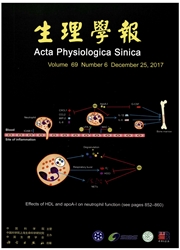

 中文摘要:
中文摘要:
脑源性神经营养因子(brain—derived neurotrophic factor,BDNF)在活动依赖的突触可塑性、学习和记忆中发挥着至关重要的作用。己知海马和杏仁核BDNF分别参与场景恐惧记忆和声音恐惧记忆的形成。本文旨在研究BDNF在前扣带回皮层(anteriorcingulatecortex,ACC)的记忆功能中的作用。用实时定量PCR和酶联免疫吸附(ELISA)技术观察ACC中BDNF水平的变化。结果显示,大鼠经过恐惧条件化(fearconditioning)训练后,ACC内BDNF的mRNA和蛋白质含量发生一过性升高;BDNF表达升高只发生在声音.电击配对训练的情况下,单独给予声音或单独给予足部电击并不引起BDNF的表达升高。在ACC局部注射BDNF抗体后,大鼠的场景恐惧记忆和声音恐惧记忆的形成均受到损害。以上结果提示,ACC中的BDNF在恐惧记忆的形成中起着重要的作用。
 英文摘要:
英文摘要:
Brain-derived neurotrophic factor (BDNF), a small dimeric secretory protein, plays a vital role in activity-dependent synaptic plasticity, learning and memory. It has been shown that BDNF in the hippocampus and amygdala participates in the formation of fear memory. However, little is known about the functional role of BDNF in the anterior cingulate cortex (ACC). To address this question, we examined the mRNA and protein levels of BDNF in the ACC of rats at various time points after fear conditioning, using quantita- tive real-time PCR and enzyme-linked immunosorbent assay (ELISA). The results showed that BDNF exhibited a temporally specific increase in both mRNA and protein levels after CS (tone) and US (foot shock) was paired. Such increase did not occur after the animals were exposed to CS or US alone. When BDNF antibody was locally infused into the ACC prior to CS-US pairing, both contextual and auditory fear memories were severely impaired. Taken together, these results suggest that BDNF in the ACC is required for the formation of fear memory.
 同期刊论文项目
同期刊论文项目
 同项目期刊论文
同项目期刊论文
 期刊信息
期刊信息
